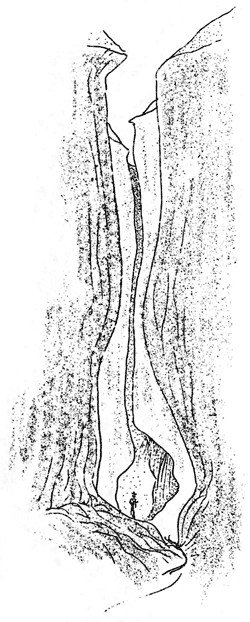Red Snow
By E. L. Clark, Ranger Naturalist
The blood-red snow fields of the Arctic, the red snow storms of tradition, and the red snows of the high Cordillera have made their appearance at Crater Lake.
On July 3 pink splotches on the snow covering the pumice flat in front of the Lodge. July 5 similar areas were noted on the snow partially blanketing the lava flows near the Witch’s Pool on Wizard Island. July 8 the phenomena was noted on the high slopes of Castle Crest, the western portion of Garfield Peak.
Scraping away the upper portions of these pink splotches, one finds the coloration intensified. A great abundance of tiny red spheres will be fond as the coloring matter when examined under a high magnification. These red spherical masses are algae, known to scientists as Protococcus nivalis, meaning earliest snow-dwelling plant.
Llao’s Hallway
By Warren G. Moody, Park Ranger
A hallway cannot always be in the best of trim to receive visitors, especially one which between seasons is being altered or decorated by Nature herself. And so at the present time Llao’s Hallway is undergoing a rigorous housecleaning and will not be in condition to receive visitors in any hospitable manner for a week or more.
The elements are at work throwing off the winter cloak from Llao’s Hallway in a most unique manner. It must necessarily take a little time to accomplish this due to the structural material of this hallway and to the unorthodox design of its passageways. Llao’s Hallway lies beneath the vortex of the V-shaped gorge, formed as White Horse Creek has eroded away a vast amount of pumice just before joining Castle Creek in its rush toward Rogue River. Ordinarily a stream flows in the bottom of the “V” of such a canyon but this stream behaves in a ravenous manner, eating deeply through the loose formation from the freshets of spring, before it dries up for the summer. The erosion due to the stream makes inroads into the earth with which the weathering on the sides of the gorge cannot keep pace. In many places this underground cutting is wider at the base than it is overhead, thus giving the appearance of a cavernous hallway. As the stream approaches its erosive level at the junction with Castle Creek it takes a more winding course and there is erosion horizontally as well as vertically. As a result the walls of Llao’s Hallway are quite artistically arched in these lower reaches.
Winter snows still linger in places at the bottom of this gore and offer serious impediment to the progress of the inquisitive visitor. The first point of difficulty is reached about halfway down and is due to an overhanging block of packed snow, about seven feet thick, caught in the narrow part of the gorge so that the stream runs some five or six feet beneath it. The sheer ends of this block of snow make it impossible to climb over the top if it even if there were no danger of its caving in. Strangely enough this snowpack melts almost entirely from the underside for the top becomes covered with the loosened soil particles from the weathering slopes above. This soil layer is a poor conductor of heat and acts as an insulator to keep the heat of the sun’s rays from reaching the snow from the top. In a few days there will be enough melted snow from the underside to allow the remainder of this block to drop and be carried away or melted by the waters of the running stream now rambling so gaily beneath it. Then it will be that the intrepid explorer who dons some waterproof boots and an extra ounce of nerve, will find delight in delving into the mysteries of Llao’s Hallway. Many vivid and lasting impressions are to be gained from this example of handiwork which Nature is in the process of making here in Crater Lake National Park.
Time Change
By Bernie Hughes, Ranger
Charity liked people and sometimes was regarded as an unofficial greeter during the 1932 season, welcoming visitors to Crater Lake National Park. With all the dignity possessed by a two-year bear, she would station herself along the Western Entrance Road and await the arrival of motorists. During the early part of each morning and the later hours of the afternoon, she would sit on the pavement begging for food.
Charity had a successful season. She was never hungry when nightfall overtook labors of the day. With the arrival of the morning sun she would again take her position, and became a familiar figure along the road.
Charity remembers 1932 as a perfect season, but with the arrival of 1933 and spring, new conditions faced her. She had become a mother of three cubs, adding greater responsibilities in the quest for food. No longer does she linger at any certain place along the highway, but has taken up patrolling seriously.
She and the cubs have been seen from Whiskey Creek, outside of the park, to Government Camp, a distance of approximately 12 miles, ranging through the woods during all hours of the day. At times when she and her offsprings wandered by Annie Springs, she caused checking rangers considerable grief and consternation by her insistence on obtaining foodstuffs. She has been known to climb into parked autos on her food forays. Despite her attempts to be “lady-like”, she has been often crude, but always a bear.


